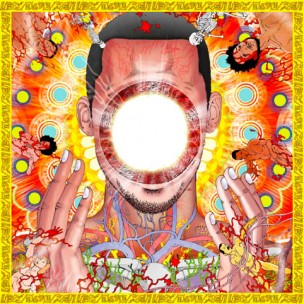Fun fact: we’re all going to die. Dark thought, right? It’s an idea that humanity has tried to ignore and to defy. But why not celebrate it?
Steven Ellison, the musician known better as Flying Lotus, certainly wants to. His fifth album, aptly titled You’re Dead, is a sprawling, morbid exploration of that sulfund void. It’s the moment of death, a tiny yet vastly significant moment, stretched out into forty minutes of transcendence.
This sort of “transcendence” is hardly a new concept for Ellison. His past two albums, 2010’s Cosmogramma and 2012’s Until The Quiet Comes, were both experiments in illustrating altered states. You’re Dead, at a base level, isn’t necessarily any different, but there’s a darker, more haunting quality to the music here. In many ways, it feels like the conclusion of a trilogy, a journey through transcendence played in reverse, perhaps a kind of resurrection. Cosmogramma investigated the mystery and lushness of heaven and the mystical, and Until The Quiet Comes seemed to delve into the stagnation and fear of limbo. You’re Dead, then, is the next piece of this puzzle, a hazy, horrifying (in the best way possible) return back to any semblance of Earth.
And every piece of this fantastical puzzle builds on the theme, adding another element of death to the work. “Coronus, The Terminator” is a sputtering sketch of the Grim Reaper, angelic vocals swirling around the pounding bass. “The Boys Who Died in Their Sleep,” which features Ellison rapping under his Captain Murphy moniker, features a haunting vocal melody that evokes ghosts and poltergeists. “Turtles” utilizes Thundercat’s impressive bass skills to build a sluggish, trance-like texture. “Ready err Not,” with its echoing drip-drop synths, sounds like the cavernous Underworld stretched out into two gorgeous minutes.
In many ways, You’re Dead is Ellison’s most human work. This comes, perhaps, from the immense jazz influence that pervades the album. Ellison, best known for his spacey, cosmic electronic work, has certainly always made jazz a part of his larger musical universe. But, where Cosmogramma and Until The Quiet Comes had fleeting moments of jazz, You’re Dead makes the genre an essential part of the album’s movement. Where his past work shrouded everything in an electronic fog, the production on You’re Dead has lost that otherworldly haze. Here, every vocalist and instrument has a crisper, fresher sound. Notes of Miles Davis’ fusion experiments can be found in the guitar-driven “Cold Dead.” The shimmering, percussion-driven post-bop of Bill Evans and John Coltrane (who, it should be noted, is Ellison’s great-uncle) can be found in “The Protest” and “Tesla.” Ellison goes so far as to feature jazz legend Herbie Hancock on “Moment of Hesitation,” a luxuriant piece of avant-garde jazz.
But a Flying Lotus jazz album is hardly a genre purist’s jazz album. It’s a jazz album that spurts, crackles, and glows, chock-full of mechanized energy. It’s an album that borrows from R&B, hip-hop, and rock, formulating something so purely and utterly unique that it almost defies classification. “Never Catch Me,” which features an utterly ferocious Kendrick Lamar, is the most depressing summer jam you’ll ever hear, mixing a jazz-rap hook with Lamar’s dizzying verses. “The Protest” shifts from a bebop groove into electronic lounge music. The Snoop-Dogg-featuring “Dead Man’s Tetris” sounds like a demonic Game Boy, erupting with pulsating 8-bit fury.
In lesser hands, an album full of so many concepts and textures could have easily become a muddled mess. But here, Ellison, ever the mastermind, weaves some of his best work together with ease. The pounding, horror-tinged bass of “Coronus, The Terminator” elegantly flows into the funky, ambient electronica of “Siren Song.” The pulse-pounding Kendrick Lamar verses on “Never Catch Me” don’t overshadow the otherwordly sheen of “Your Potential//The Beyond.” It’s an album of varying influences, some mixing and matching, some building contrasts, but all unified under this fascinating, perhaps horrifying theme of death.
It’s unclear at the moment whether You’re Dead is “better” than Cosmogramma or Until the Quiet Comes. It’s arguably a disservice to all three works to give out that award. You’re Dead is so vastly different in sound and tone than Ellison’s other work that it feels almost unfair to compare. You’re Dead, simply by virtue of its title, is not as subtle in theme as Cosmogramma or Until The Quiet Comes. But it’s just as mature, dense, and unified as anything Ellison has put out since the start of the decade.
We’re all going to die, as You’re Dead hammers in. But if Flying Lotus has his way, it’ll be one hell of a ride.
